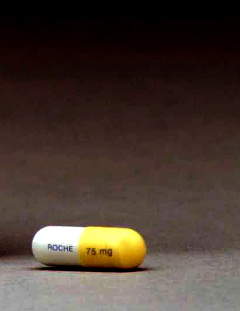Flu fight, facts questioned while stockpiles grow
 A new study has kicked off a fight between international medical authorities and drug companies.
A new study has kicked off a fight between international medical authorities and drug companies.
The stoush is over the anti-flu medicine Tamiflu, which is stockpiled around the world in case of an outbreak. Reports now say Tamiflu may not be all that the company behind it, drug-maker Roche, has promised.
A study by the Cochrane Review research network and the British Medical Journal (BMJ) says there is a lack of good evidence behind claims that the drugs reduce hospital admissions or flu complications.
The review by respected research bodies found Tamiflu, known generically as oseltamivir, has very few beneficial effects, and comes with adverse side effects that have previously been down-played or overlooked.
“The original evidence presented to government agencies around the world was incomplete,” Fiona Godlee, editor of the BMJ told Reuters.
The BMJ has been on a four-year campaign to make Roche to give up all its Tamiflu data.
“And when they [the Cochrane review team] eventually received the full information on these drugs, the complete evidence gives a very much less positive picture,” Godlee said.
The Cochrane report says compared with a placebo, Tamiflu can bring down the time it takes to beat flu-like symptoms by a few hours, on average reducing the time from 7 days to 6.3 days in adults. But the researchers say the effect in children is much less certain.
The team found no evidence of reduced hospitalisation rates or fewer serious flu complications from Tamiflu.
There was no evidence of reduction in pneumonia, bronchitis, sinusitis or ear infections in either adults or children.
Tamiflu increases the risk of nausea and vomiting in adults by about 4 per cent , closer to 5 per cent in children.
Cochrane reviewers found a reported increased risk of psychiatric events – “mood changes” - of around 1 per cent when Tamiflu was used preventatively on uninfected patients.
Godlee says the battle with Roche has been like a “really lengthy cat and mouse, Alice in Wonderland, bizarre experience of trying to get data on a drug which governments around the world were busy buying, stockpiling and spending billions of dollars on”.
“Why did no-one else demand this level of scrutiny before spending such huge sums on one drug?” she says.
“The whole story gives an extraordinary picture of the entrenched flaws in the current system of drug regulation and drug evaluation.”








 Print
Print